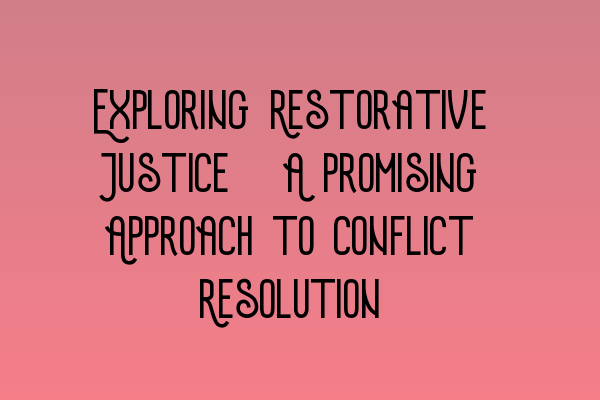Exploring Restorative Justice: A Promising Approach to Conflict Resolution
Restorative justice is a powerful tool that offers a promising approach to conflict resolution in our criminal justice system. It focuses on repairing the harm caused by criminal behavior while holding offenders accountable for their actions. This innovative approach prioritizes the needs and voices of victims and aims to restore harmonious relationships in the community.
At SQE Criminal Law & Practice Law UK, we believe in exploring the various methods and approaches available to address conflicts and crime in our society. Restorative justice is one such approach that showcases great potential.
The Principles of Restorative Justice
Restorative justice is based on several key principles:
- Encounter: All parties affected by the crime, including the victim, offender, and community members, come together to engage in a facilitated dialogue.
- Empowerment: The process provides an opportunity for victims to express their feelings, needs, and concerns, empowering them to have a voice in the resolution.
- Accountability: Offenders take responsibility for their actions and work towards making amends and repairing the harm caused.
- Reintegration: The focus lies on reintegrating offenders back into the community, helping them become productive and law-abiding citizens.
Benefits of Restorative Justice
Restorative justice offers several benefits:
- Victim Satisfaction: By involving victims in the process, restorative justice provides them with a chance to express their emotions and needs, leading to greater satisfaction and healing.
- Reduced Recidivism: Studies have shown that restorative justice programs contribute to lower reoffending rates, as offenders understand the impact of their actions and actively work towards making positive changes.
- Community Healing: Restorative justice fosters a sense of community by involving community members in the resolution process, thereby addressing the root causes of crime and building safer neighborhoods.
- Efficiency and Cost-Effectiveness: Restorative justice programs are often more efficient and cost-effective than traditional court processes, as they focus on resolving conflicts rather than prolonged legal battles.
Implementing Restorative Justice
Implementing restorative justice requires a comprehensive approach that involves collaboration between legal professionals, community organizations, and support services. Training and education, such as the SQE 2 Preparation Courses and SQE 1 Preparation Courses, are essential for legal practitioners to understand and effectively utilize restorative justice principles.
It is also crucial to have well-established frameworks and guidelines in place to ensure the ethical and fair implementation of restorative justice practices. Continuous evaluation and improvement are essential to uphold the integrity and efficacy of this approach.
Conclusion
In conclusion, restorative justice is a promising approach to conflict resolution that prioritizes healing, accountability, and community involvement. It offers an alternative to traditional punitive measures, focusing on repairing harm and building stronger and more resilient communities.
As legal professionals at SQE Criminal Law & Practice Law UK, we recognize the value of exploring innovative approaches like restorative justice to create a more just and compassionate society. By integrating restorative justice principles into our legal system, we can pave the way for more meaningful and impactful resolutions for victims, offenders, and our communities as a whole.
